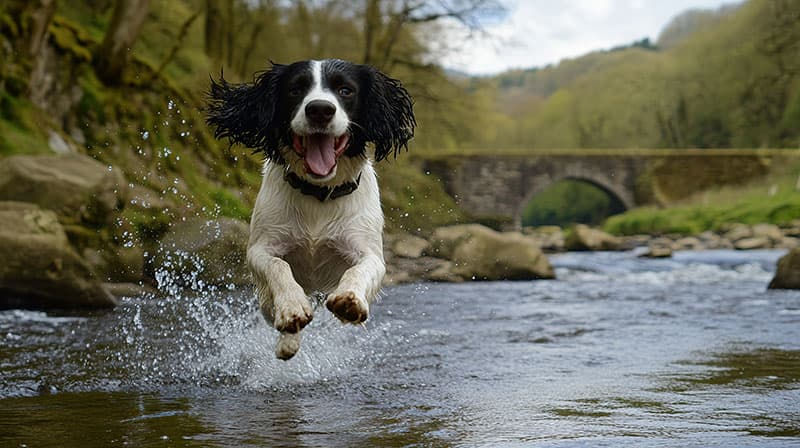Daily Dog Walking: A Foundation for Canine Wellbeing in Edinburgh
- Training Trails

- Jul 29, 2025
- 3 min read
Updated: Aug 9, 2025

For many owners, the daily walk can feel like just another item on a busy to-do list. But for your dog, it is far more than that. It is their chance to move, think, explore, and engage with the world — something that goes well beyond a toilet break or a quick run about the park.
A truly enriching walk supports every aspect of your dog’s wellbeing: it provides physical exercise, mental engagement, social connection, and an outlet for their most instinctive behaviours. Yet modern life often makes it difficult to offer this level of experience consistently.
In this article, we’ll explore why walking your dog matters so much — and how the right kind of walk can transform their quality of life.
Unleashing Their Inner Athlete: The Physical Benefits of Dog Walking
While walks can certainly help “take the edge off,” the physical benefits extend well beyond simply tiring your dog out:
Cardiovascular health: Regular walking supports heart and lung function. Opportunities to increase the pace to a run or engage in safe off-lead exercise enhance these benefits further.
Weight management: Movement helps regulate weight and reduces the risk of obesity-related illness.
Digestive support: Exercise can aid digestion and urinary health by supporting regular function.
Musculoskeletal strength: Varied terrain builds resilience in muscles, joints, and connective tissue.
Mood regulation: Physical activity releases endorphins and serotonin, which help dogs manage stress and maintain a balanced mood.
Daily dog walking is one of the simplest, most accessible ways to safeguard your dog’s long-term health — and it also helps to bring calm and balance to life at home.
Satisfying Natural Instincts: Tapping Into Your Dog's Drives
It’s often said that a dog without a job will find one for themselves. Whether that means herding joggers, digging up flower beds, or barking excessively, these behaviours usually stem from unmet instinctual needs.
Most dogs were bred to aid humans with specific tasks — to hunt, herd, retrieve, or guard — and those innate drives remain strong even though our lifestyles have changed. A well-structured walk allows them to channel those instincts in appropriate ways such as:
Chase games: Controlled chasing through play satisfies predatory drive. A slow-moving frisbee may appeal to herding breeds, while soft lure toys can be ideal for those with stronger hunting instincts.
Retrieve games: Collecting and returning objects taps into natural retrieving behaviours, particularly rewarding for gun dog breeds.
Digging opportunities: Allowing digging in safe spaces, such as a sandy beach, can be especially satisfying for terriers and other dogs driven to dig.
Meeting these needs doesn’t just reduce unwanted behaviour — it leaves dogs more settled, confident, and content.
Mental Exercise Matters: A Tired Brain Is a Happy Dog
Mental stimulation can be just as fatiguing as physical exercise, and for many working breeds, it is this cognitive engagement that truly helps them relax at home. An enriching walk gives your dog the opportunity to engage their brain through activities like:
Scent games: Searching for treats or toys in long grass or leaves encourages focus and draws on natural foraging behaviours. By engaging the olfactory system these activities can help to calm your dog.
Training on the go: Practising cues such as sit, stay, or come in real-world settings strengthens learning where it is needed the most. It also encourages your dog to engage their thinking brain, rather than relying solely on instinct or impulse.
Agility in nature: Navigating over logs, weaving between trees, or balancing on rocks uses both body and brain — building confidence as well as coordination.
These small moments of problem-solving and focus don’t just tire your dog out; they deepen your bond and help your dog tune into you even in distracting environments.
Staying Social: Supporting Canine Connections
For dogs who enjoy the company of their own species, positive interactions with other canines are invaluable for maintaining social skills and emotional wellbeing. Well-managed walks can provide opportunities to:
Practise natural communication
Maintain and refine social abilities
Build confidence in a variety of environments
And for dogs who are less overtly social, walking still offers meaningful connection. Simply moving through the world alongside you or a trusted companion fulfils their need for partnership and provides a shared sense of purpose.
The Daily Walk: More Than Exercise
At its best, a daily walk isn’t just about exercise — it is a means of meeting the full range of your dog’s needs: physical, emotional, instinctual, and social.
While not every day allows for the perfect walk, even small changes can make a real difference to your dog’s wellbeing.
And when life gets busy, it’s good to know there’s someone who understands just how much these walks matter.
Learn more about how our professional, expert-led adventures can transform your dog's life. Explore Our Dog Walking Service in Edinburgh.


